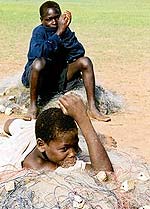| Child
Migration
 Research
and policy discussion on child migrants commonly concentrate on
children who have been coerced into cross national or transnational
movement to work in situations which are either abusive or exploitative
in themselves, or are abusive or exploitative because of the young
age of the children. In contrast, the vast majority of independent
child migration (that is where the child moves without his or her
family) is children who move within their own countries or between
contingent or nearby countries to work in a wide variety of occupations
or to go to school. Research
and policy discussion on child migrants commonly concentrate on
children who have been coerced into cross national or transnational
movement to work in situations which are either abusive or exploitative
in themselves, or are abusive or exploitative because of the young
age of the children. In contrast, the vast majority of independent
child migration (that is where the child moves without his or her
family) is children who move within their own countries or between
contingent or nearby countries to work in a wide variety of occupations
or to go to school.
The DRC research focuses on this kind of child migrant and seeks
to investigate which kind of children migrate, why they migrate,
what their experience is of migration and what impact it has upon
them and their links with their families. So far, detailed field
studies have been carried out in northern Ghana, Burkina Faso, the
southern state of Karnataka in India and in Bangladesh, whilst related
work of Sussex doctoral students is taking place in Brazil and elsewhere.
Much of this work is qualitative and ethnographic in nature, seeking
to trace movements of children and understand the experience of
migration from the perspective of children themselves. However,
quantitative surveys have been carried out in source and destination
areas in Karnataka, and in destination areas in Ghana, and follow
up surveys in villages of origin in northern Ghana are planned for
2006.
These studies find that high rates of child migration occur from
relatively impoverished areas where many adults use migration as
part of survival or livelihood strategies. In these circumstances
many children migrate to meet their own ambitions and aspirations
or out of their own sense of responsibility to their parents. They
are certainly not simple pawns in family livelihood strategies,
nor are they the victims of traffickers. Each of the studies aims
to explore the incentives and motives children have for migrating,
the child's role in the decision making processes and the arrangements
made to facilitate migration and to access work and education. Each
study also looks at the impact on children's wellbeing and the risks
and dangers they face.
Conceptualizing children as exercising agency in these decisions
to migrate and the findings that there may be some positive outcomes
for children are both controversial and challenging, particularly
in the context of the policy implications of this research. Our
dissemination plans include specific efforts to consider how policy
priorities for improving outcomes for this kind of child migrant
might be integrated with child protection policies and into the
trafficking framework which dominates international development
discussions. As part of this strategy, RMMRU in Bangladesh held
a workshop In December that presented the findings of their project
(3b(3) below) to an invited audience.
Individual researchers are currently preparing a number of papers
for publication and the whole team will be presenting their work
to the research and policy communities in a series of workshops.
The research findings will be brought together in a landmark edited
volume on autonomous child migration.
|





